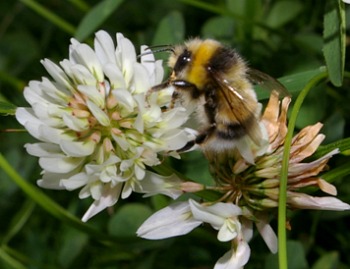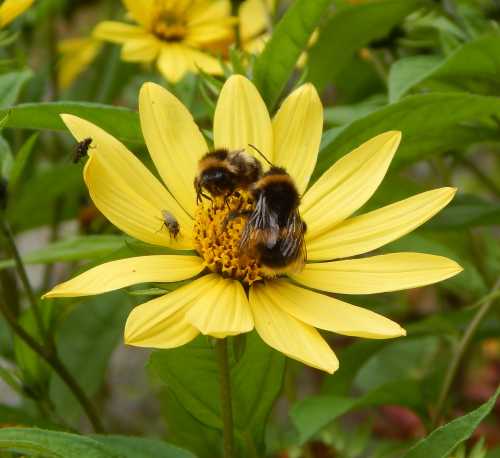Do Bee Nests Attract Wasps?
A reader contacted me about a bee nest in her roof, and raised a few concerns. Firstly, do bee nests attract wasps, and was there a risk that wasps would move into the nest?
In addition, she wondered whether bee nests cause damage. My response is below. Had the nest been that of honey bees it would have been different, and I would have advised her to call a beekeeper.
But in this case, I'm confident the lady definitely had a bumble bee nest in her roof. (It may seem strange, but I must admit, I felt a little envious, because I wish I had a bumble bee nest in my roof!)
Query: Do bumble bee nests attract wasps and will they move into a bumble bee nest?
"Hello
Some bees have moved into my bathroom roof. Pretty sure they are white tailed bumble bees, and there are a few hundred!
I wanted to be sure they won't damaged the roof...I am pretty sure they won't, but do wasps move into empty hives?
Also will the queen move on over winter? Please help soothe my worries. Thank you."
My reply:
Firstly, to address the concern about wasps – i.e. are wasps attracted to bee nests and will they move into the nest?
When social wasps are establishing their own colonies and nests, they have a number of important tasks. They have to:
- find materials to build a nest - this will be composed of fine scrapings of wood, and will be very different from that of a bumble bee. Below is a picture of a wasp nest, and you can read more about wasp nests.
which means worker wasps are busy finding nest material and food for the young (insects and invertebrates such as aphids).
- Secondly, it will be vital for the wasps to gather food to feed their young - this could comprise, for example, young larvae of other insects, or aphids from the nearest infested plant.
Therefore, worker wasps do not take over the nests of bees. However, they may try to raid a nest. This usually involves a wasp or wasps being attracted to the nectar pots, or possibly to kill bees to take back to their own larvae to eat.
A mature bumble bee colony would probably stand a reasonable chance of defending itself against a few wasps.
Given your bumble bee colony sounds well established, wasps are less likely to be successful in this case, because worker bumble bees would defend the nest and kill the attackers. However, in the worst case scenario, a lot of wasps could arrive.

However, I actually think it’s a little early yet for a wasp colony to be established to enable an attack of many wasps, but I can understand that lots of wasps would cause concern if that were to happen.
But how can you deter wasps in the future?
You could try a Waspinator. Since wasps are territorial, Waspinators work by fooling wasps into thinking a wasp colony is already present. This helps to deter them from building a nest - to be successful they must be placed early in the season before wasps arrive.
Some beekeepers swear by them. They can be hung up year after year too. I suggest you put the hook in place during the day, and hang up the waspinator in the evening, then leave it there.
With regard to concern for the bumble bees themselves…. well, I’m afraid bumble bees have to cope with predators and natural enemies, and we have to hope they will thrive (it sounds like they are doing well).
Anyway, all this is worrying about something that may not
even happen, and probably won't.
Will the bumble bee queen move on?
Secondly, to address your concern about the bumble bee queen: The incumbent queen will die at the end of the season. Only new queens survive. It is they who mate, hibernate, and establish a new colony the following year. This is part of the life cycle of the bumble bee colony.
I recommend you clear away the old bumble bee nest at the end of the year, if you want to ensure you do not attract mice. Check there are no queens hibernating in the old nest.
You might also want to block
the entrance to the nest, to deter bees if you do not wish to have a nest there in the future – but
please ensure no bees are trapped inside.
I hope this helps, and thanks so much for caring about the bees."
More information about bumble bee nests
- Bee Nests FAQS About Bumble, Honey And Solitary bee Nests Information about bee nests, types of habitat. Making a nest site for bees in your garden. Advice if you are concerned about finding a nest on your property.
- Bee Nest Removal and Bumble Bee Nests - Information And Advice How to identify a bumble bee nest and how to go about removing one if absolutely necessary. Links to a variety of nest scenarios, and alternative solutions.
- 5 Reasons To Protect Bumble Bee Nests Bumble bee colonies do not last long, and they are not aggressive.
- Disturbed A Bee Nest? What Should You Do? Disturbed a bee nest, or want to help a nest that has been damaged? How about a nest in an inconvenient place? Here is some advice about what to do.
